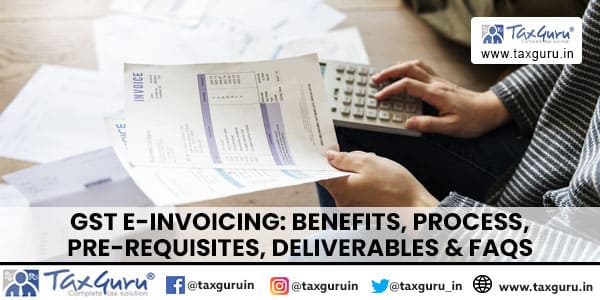In today’s digital age, the Indian government has been striving to modernize and streamline various aspects of taxation. One significant stride in this direction is the introduction of E-Invoicing under the Goods and Services Tax (GST) regime. E-invoicing represents a fundamental shift in how businesses generate, transmit, and manage their invoices, bringing with it a host of benefits and opportunities for efficiency improvement. This article elucidates the significance of E-Invoicing, its benefits, the process involved, prerequisites, FAQs, and related services.
Benefits
1. Streamlined Compliance: E-Invoicing automates the generation and submission of invoices directly to the GST portal, reducing manual effort and ensuring compliance with regulations. This not only saves time but also minimizes the risk of errors associated with manual data entry.
2. Improved Accuracy: By adhering to standardized formats and automated processes, E-Invoicing significantly reduces the likelihood of errors in invoicing data. This ensures that the information submitted to the GST portal is consistent and reliable, thereby enhancing overall compliance.
3. Faster Processing: Electronic invoices enable faster processing by tax authorities, leading to quicker refunds and resolution of disputes. With E-Invoicing, businesses can expect smoother interactions with tax authorities, resulting in improved cash flow and reduced administrative burden.
4. Enhanced Data Analytics: The digital nature of E-Invoicing facilitates better data analytics, allowing businesses to gain valuable insights into their operations. By analyzing invoicing data, businesses can identify trends, track expenses, and make informed decisions to optimize their processes and maximize profitability.
5. Cost Savings: E-Invoicing eliminates the need for paper-based processes and reduces manual intervention in invoice generation and submission. This results in cost savings associated with printing, storage, and manpower, making it a cost-effective solution for businesses of all sizes.

Steps/Process Involved
1. Invoice Generation: Businesses generate invoices using accounting software or ERP systems compliant with E-Invoicing standards.
2. Validation: The generated invoices undergo validation against the specified schema and are digitally signed for authenticity.
3. Registration: Registered users upload the validated invoices to the Invoice Registration Portal (IRP) for registration.
4. IRN Generation: The IRP assigns a unique Invoice Reference Number (IRN) to each invoice and generates a digitally signed QR code.
5. Transmission: The registered and authenticated invoices are then transmitted to the recipient and reported to the GST portal, ensuring seamless compliance.
Pre-requisites
Before adopting E-Invoicing, businesses need to ensure they meet the following prerequisites:
– Valid GST registration
– Access to compliant accounting software or ERP system
– Secure internet connection for online transactions
– Knowledge of E-Invoicing standards and procedures
Deliverables
By embracing E-Invoicing, businesses can expect to receive the following deliverables:
– E-Invoice generation and registration
– Unique Invoice Reference Number (IRN) for each invoice
– Digital signature for authentication
– QR code for easy verification
– Seamless integration with existing accounting systems
FAQs
1. What are the penalties for non-compliance with E-Invoicing regulations?
– Penalties for non-compliance with E-Invoicing regulations can include fines and other punitive measures as per the GST laws. These penalties may vary depending on the severity of the violation and the discretion of the tax authorities.
2. Is E-Invoicing mandatory for all businesses registered under GST?
– As of now, E-Invoicing is mandatory for businesses with a turnover exceeding a certain threshold, as specified by the government. However, it’s essential for all businesses to stay updated with regulatory changes and compliance requirements.
3. Can I use E-Invoicing for B2C transactions?
– E-Invoicing is primarily designed for B2B transactions and may not be mandatory for B2C transactions. However, businesses can choose to implement E-Invoicing for B2C transactions as part of their compliance and operational efficiency initiatives.
4. What are the technical specifications required for E-Invoicing compliance?
– Technical specifications for E-Invoicing compliance include adherence to the prescribed invoice schema, compatibility with the Invoice Registration Portal (IRP), and compliance with digital signature requirements. Businesses may need to ensure their accounting software or ERP systems meet these specifications for seamless integration.
5. How does E-Invoicing impact my current accounting processes?
– E-Invoicing may require businesses to update their accounting processes to ensure compatibility with electronic invoicing standards. This may involve training staff, integrating new software solutions, and implementing standardized procedures for invoice generation and submission.
Related Services
– GST Compliance Solutions
– Digital Transformation Services
– Accounting Software Integration
– Taxation Advisory Services
In conclusion, E-Invoicing under GST represents a significant step forward in the digitization of taxation processes in India. By embracing E-Invoicing, businesses can not only ensure compliance with regulatory requirements but also unlock opportunities for efficiency improvement, cost savings, and data-driven decision-making. As the digital landscape continues to evolve, E-Invoicing is poised to become an integral part of modern business practices, enabling businesses to thrive in an increasingly competitive environment.





